.
Only two chapters back I said that Germany is a boring country, but obviously that is not necessarily true. Actually, once I recharged batteries thanks to my long stay in Bamberg, the day I finally carry on the journey turns out to be one of the most amusing I’ve ever had in this country: first SE along route 470, a charming road, full of corners (most of all from Wiesenttal on) and of hamonious landscapes, geologically peculiar.
Tuchersfeld has been, perhaps, the village with most singular surroundings I’ve crossed so far, with its cute traditional houses among bizarre rocky sculptures carved by nature, bestowing it a special character.
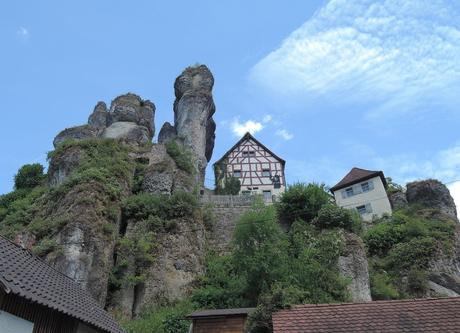
The bizarre rocky environment of Tuchersfeld.
After climbing to the rock in the photograph, along a track longer and harder than it seems, I’ve made the most of the stop by drinking a beer and having some lunch at a local gasthof.
Then, still going SE, always along secondary roads (quite acceptable for a biker), I’ve keep going until, by the early evening, a small sign on the shoulder has lured me into a cozy hotel (Panorama am See) in the little village of Gütenland, which I guess must mean good land.
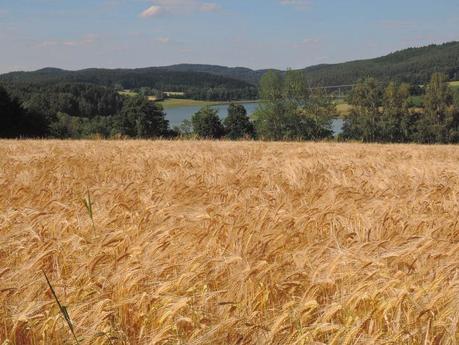
Good land, fertile land.
And indeed it is good!, most of all under this wonderful and warm sunset light: with its barns and tidy houses on a hill overlooking the Eixendorfer reservoir, the wheat burning under the sun rays, deer and gueese lazying around at a neighbouring farm…
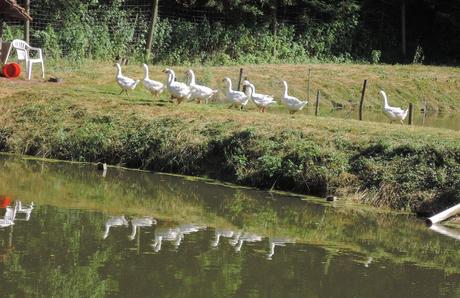
At a farm in Gütenland.
Despite how small and out-of-the-way this place is, there are several customers at the restaurant’s terraze, which is perfectly situated on top of the hill. I order a salad with deer meat chops and half a bottle of country wine, white. Indulging myself in contemplating the reservoir, I relish on every bite of my dish (excellent cook!) and every zip of my drink.
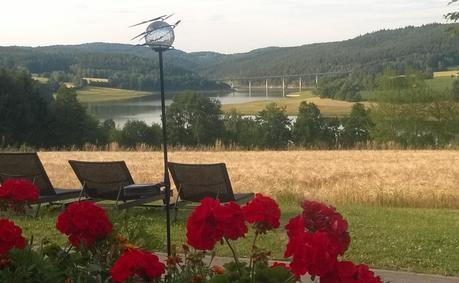
View from Panorama am See’s dinner terrace.
Finally, once satisfied my appetite, and considering that walking is the must-do complement for a motorized traveler, I’ve taken a long stroll along the neighbouring hamlets: Seebarn, Haslarn and Stetten. As I was promenading, the environment inspired me with similar thoughts as those of two chapters ago: despite the houses in German villages being all very fine in their perfect grass plots, surrounded by trees, all neat and dandy, well taken care of gardens with flowers and vegetables, lace curtained windows with cute wooden blinds, their board fences all well painted, and an idyllic smoking chimney, like those little houses we used to play with in our childhood or the ones we cut out and glued together in manual arts classes, daydream houses, fairy tale houses; despite -on the other hand- being uncouth and poor those along the Mediterranean countries, irregular and dissimilar, with small window openings onto their dented walls, without gardens or trees, decayed the woodwork, stones keeping the tiles in place, asbestos patches on the roofs and twenty other flaws, yet those villages in France, Spain or Italy, with their narrow streets, archways and passageways, and their mysterious corners, those have a charm and a magic whereof these in Germany lack. May every house, on its own, be nicer here in the North than there in the South, but as a whole, the overall impression is quite more appealing there than here. That’s for me, at least. Is this again a paradox of perfection?
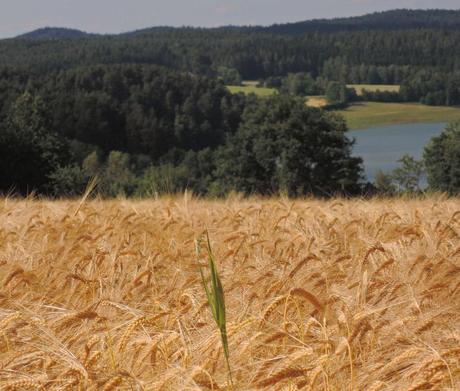
A weed can be, by contrast, the nicest one.
* * *
And now it’s another day. As I’m heading Austria for a second time, I keep the same SE course as yesterday, picking those roads further from the maddening crowd, which are those closest to the Czech border, passing along forsaken villages like Waldmunchen, Lohberghunte, Frauenau, Freyung or, lastly, Breitenberg, right by the border. It’s all forests around here, in this German region; vast expanses of lush, shady woodlands. I know some ignorant who despises German woods because -says he- they’re replanted. Ignorance is sassy, my grandma used to say.
The storm has come out of a sudden, almost with fright of itself. True, the evening has been gathering clouds in the sky until having it overcast, but not dark nor menacing. My dinner at gaststätte Pension Jagdhof (very tasty; who says Germans can’t cook? Once again ignorance) has taken place outdoors, and I still had time for a daring walk across a little grove behind the village, silent, dark and humid, which lead to the hamlet of Ungarsteig.
Then I’ve come back, now aong the road, to my hotel room. As I arrange some things it gets dark, and suddenly I hear a buzz as of something intangible approaching. I step on the balcony just in time to see how the swift wind gust, like the puff of a god, sweeps the street away and bends down trees and bush. It passes the way ghosts pass as we’re told in the movies: silent, yet leaving an empitiness behind which freezes our blood. Inmediately afterwards, barely a few seconds, the downpour arrives, advancing down the street like a courtain, and all is deluge now. It rains with force, with rage, with strong gusts drawing whip-like water patterns on the pavement; spectacular. And no thunder! Spellbound, I watch behind the window. Finally it easies off and there remains an intermittent spit, which still lingers on by the time when, already in bed, the sleep takes me away.
.

